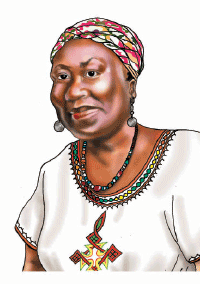By Prof Remi Sonaiya
In a television interview broadcast a couple of years ago, renowned South African playwright and actor, John Kani, co-author of Sizwe Banzi is Dead, recounted how, during the apartheid era, he was regularly accused of writing protest plays. He stated emphatically that he did not consider himself as a protest writer but rather as a chronicler of events, merely faithfully reflecting in his writings events that he saw taking place in the society to which he belonged. He believed it to be his duty as a writer, and nothing would stop him from fulfilling it – not any harassment by the authorities or even the possibility of imprisonment on Robben Island. Indeed, being sentenced to serve time on that infamous island’s prison was considered by him and his colleagues then a great honour and not too big a price to pay in the fight for the freedom of their people.
Interestingly, that kind of perception of issues sounds strange and far removed from our consciousness now. Those were the days when people were ready to pay a price for what they believed; the days when Wole Soyinka had to suffer imprisonment by the Nigerian federal government during the Civil War because of his presumed support for the Biafran secessionists; or even the days, several years later, of Ken Saro-Wiwa paying with his life for the emancipation of his people in the Niger Delta. Those were the days of “crazy” Fela Anikulapo-Kuti daring to take on the government through his music, insisting, for example, that the citizens of Nigeria deserved to be given “water, light, food, house”. All of that appears to be over now; the writers and musicians have mostly gone silent, having no reason anymore to engage in the kinds of protests which earned their former colleagues the ire of those in power. Of course, the times have changed. We no longer live under the tyrannical rule of military dictators. Leaders who emerge in a democratic system cannot easily round up people and put them in jail.
Thus, have we then agreed that Nigeria is now fully emancipated, especially since we are no longer under the rule of military dictators? The Niger Delta militants of yesteryears have gone on to become government functionaries. The musicians and actors are basking in the largesse which they now enjoy at the hands of our benevolent leaders, performing at the endless ceremonies held in our government villas, and having many of their activities accorded state and federal government sponsorship. The entente which exists between them and the political elite is equally displayed during the period of elections, with artistes performing the jingles for the major candidates.
One recalls with nostalgia the fact that several African intellectuals, many of whom were in the Arts, contributed significantly to the development of our continent, for instance, through their active engagement in the fight for independence in their respective countries, and later in shaping the development of their nations through political leadership. Late Léopold Senghor of Senegal is a shining example in this regard. These writers and artistes were passionate and original in their thinking, and this led them to form vibrant intellectual movements like Negritude. One wonders, where are the intellectual movements of our day? Where are the Majek Fasheks who would focus on some particular issues (like Fashek did with demanding the release of Nelson Mandela from prison) and raise social consciousness about them? What themes engage our writers and artistes these days?
It is regrettable that this tradition of what one could call the “activist artiste” has not been preserved within our society, particularly in the area of music. Music is such a powerful tool for creating and maintaining social awareness on issues. While it is not necessary for every musician to compose and perform “issue-based” songs, it is desirable to have some who do, especially in a society like ours where there is a high level of dysfunctionality. Where are the Nigerian musicians singing about corruption and all the other ills plaguing us as a nation? Our preoccupation, rather, is for us as individuals to get ahead, make a way for ourselves in spite of the hardship in the land. That is what is reflected in most of the music being composed – “I don get alert, God win!” All of us are waiting to get our alert! Meanwhile, politicians and civil servants continue to steal our money and impoverish us; judges sell favourable judgment to the highest bidder; kidnappers and murderous herdsmen continue to have a field day in many parts of the country. All of that is happening and not being “chronicled” in music.
Of course, the social media is playing an important role in providing a platform for creating awareness on social issues – but the concern here is about artistes, and the impact is different. Nobody goes around singing or humming something they read on social media. That is the impact of music – it follows you everywhere, either in your own head or on radio or television as it is broadcast. What I have come across in Yoruba land, for example, are recordings by ewì performers on current social issues. This is a good development, and the local populations listen to them and are “conscientised” on those issues. In my own thinking, there is an important role which our artistes are failing to play. A powerful tool is in their hands which should not be left unused.
Editor’s Note: This article was first published last year. We are republishing it due to popular demand













